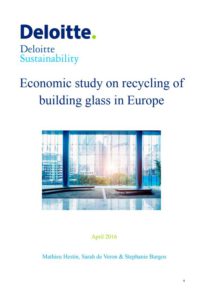Economic study on recycling of building glass in Europe – Deloitte
As European authorities look into ways to make the concept of a ‘Circular Economy’ real in the construction sector, a new study of Deloitte Sustainability analyses the present situation in the
management and recycling of end-of-life building glass in the EU. This study, commissioned by Glass for Europe, is the first of its kind in terms of depth of analysis on this topic and methodology. It provides useful insight into the realities of a building material whose recycling potential is not yet fully utilised.
In a first part, the study provides the most elaborated quantification of building glass waste where so far only rough estimates were available. Based on the in-depth analysis of six pilot countries and a rigorous statistical methodology, it is found that the total glass waste arising from renovation and demolition of buildings in the EU in 2013 approached about 1.5 Million tonnes, of which 58% originates from the residential sector and 42% from the tertiary sector. The study of six countries, i.e. France, Germany, Italy, the Netherlands, Poland and the
United-Kingdom, also helped identify best practices and pilot projects in the field of building glass waste.
In a second part, the study analyses the environmental and economic costs and benefits of different end-of-life routes for building glass waste. It finds that significant environmental benefits can be expected from improved recycling of building glass waste be it in terms of saving carbon emissions, avoiding waste going to landfill and saving virgin raw material.
The economic modelling proved however to be more difficult as consultants were faced with a lack of reliable data and the confidential nature of information in this field. Although the study shows some interesting trends, such as the generally higher cost of the recycling route compared to landfilling, the differences between light renovation and building demolition, the importance of the proper collection infrastructure at source, the impacts of transport distances and the need for solutions fitting the regional contexts, etc. data and exact results ‘should be considered with care’ according to the consultants themselves.




